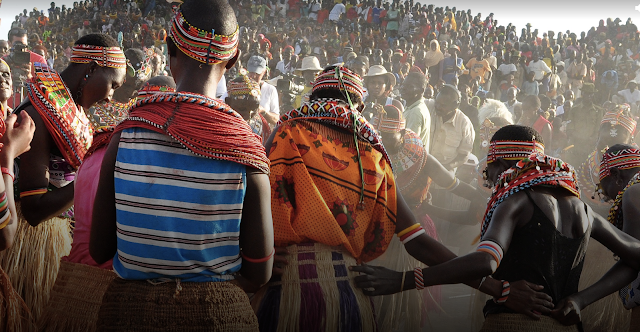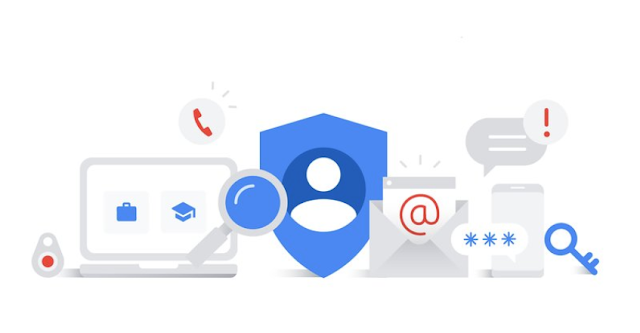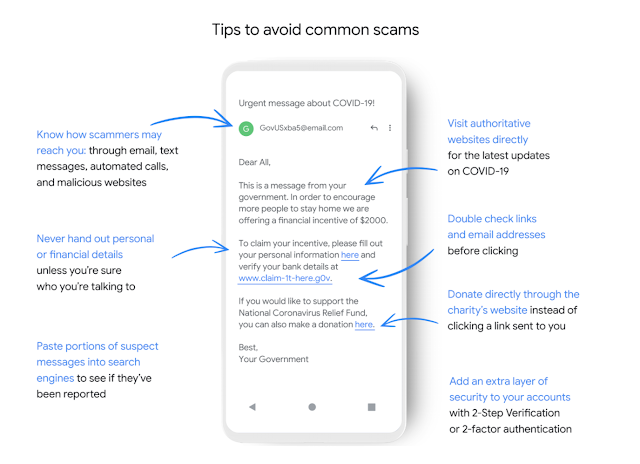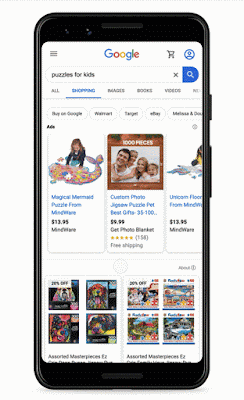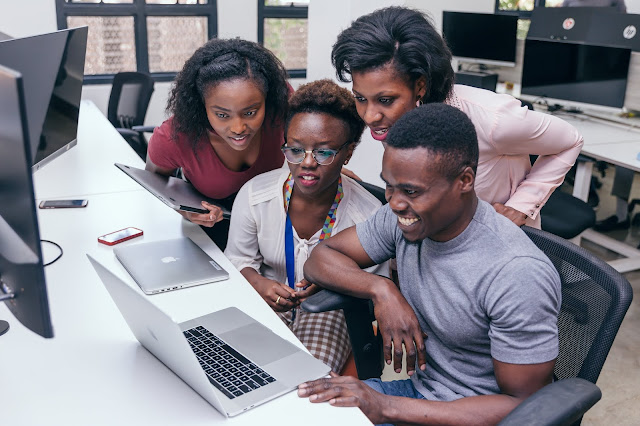The spread of COVID-19 has had a devastating impact on the health, jobs and lives of millions of Africans and people around the world. We’ve all had to make fundamental changes to the way we live and work, and businesses everywhere have been impacted. Yet we’ve also heard inspiring stories of healthcare workers on the front lines, businesses providing vital resources and support, and families and communities being there for one another—showing us that if everyone plays their part, we can and will get through this together.
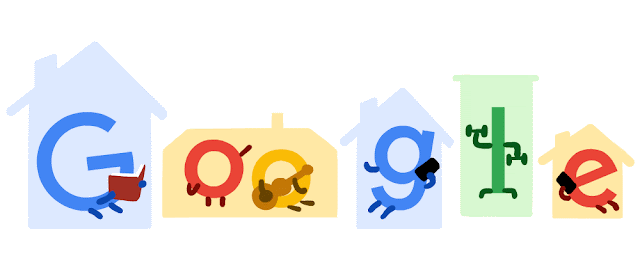 |
| The “Stay home, Save lives” Doodle on the Google across Africa homepage 3-5 April |
Overcoming a crisis of this scale will take a sustained effort, and we want to do
everything we can to help. Since the virus first began to spread, our focus at Google has been on making sure millions of people in Africa and around the world have the
information and tools they need. But we know there’s much more work ahead.
We’re sharing here the actions we’ve taken to support Africans both in the ongoing short-term response to the virus and in the longer-term, concentrating on three priorities:
- Helping make reliable information available;
- Helping Teachers and Students
- Helping Small Businesses
We’re working closely with governments, businesses, health and education sectors, and not-for-profit and community organisations to ensure people can get help when they need it most. We want to build on our existing partnerships and programs to support Africans, while responding to the urgent challenges we now face.
Helping make reliable information availableIt's crucial that people have access to health information they can trust online, so they can make the right decisions to protect themselves and those around them from COVID-19. We've surfaced the
latest updates and health advice from government and health authorities, promoted awareness campaigns, shared
travel advisories, and provided regular updates on the Search
trends we are seeing as Africans look for help and information. We’ve also provided ads grants to a number of African governments to help communicate information to the public.
To ensure Africans have access to all the latest information in one spot, we’ve launched a local COVID-19 microsite featuring the latest updates and health resources. And we’re providing
Community Mobility Reports that analyse aggregate, anonymised location history and provide local insights on the impact of social distancing.
Alongside our work to promote authoritative sources, we’ve stepped up our efforts to curb misinformation spreading on Google, YouTube or through apps on the Play Store. We have already taken down thousands of YouTube videos featuring dangerous or misleading coronavirus information since early February 2020, and continue to remove videos that promote medically unproven methods to prevent coronavirus in place of seeking medical treatment.
We're going to build on these efforts in the months ahead to ensure people have access to
reliable information. In Africa, we’re supporting
Africa Check to
connect fact-checkers and reporters to expert individuals and organisations around the COVID-19 crisis. We’re also supporting
Code for Africa as they provide crucial training and resources for journalists working remotely, and expanding our global investment in fact checking organization
First Draft to strengthen efforts to combat misinformation.
Helping Teachers and Students across AfricaMillions of African students are out of school because of restrictions on movement and gatherings. That’s putting pressure on families, schools and the incredible teachers who foster our children’s passion for learning.
To help teachers get the support they need to teach remotely, we’ve made tools like Google Meet and Google Classroom
available for free, provided training and tips through both
Google and
YouTube (and YouTube creators are getting on board too—check out the latest tips from
Eddie Woo), and launched
Teach from Home with UNESCO as a central hub for teachers around the world.
We’ve also built a remote work hub on the
Grow with Google site to help people work, teach and learn from anywhere, along with a
distance learning website that includes training materials and a new
YouTube Learning Hub to help schools, teachers, parents and students. And we launched a local
#StayHome #WithMe campaign on YouTube to help people feel more connected, entertained and informed during social distancing.
Schools in Africa can have access to expedited
G Suite for Education domain sign-ups (for free) and we are working with education departments around the country to pre-approve school domains to help educators and learners continue their teaching and learning remotely and explore further opportunities for support.
We all know the power of great teachers and inspiring lessons, and we hope these steps will help our kids continue to learn from home, and return energised when school resumes.
Helping Small BusinessesSmall businesses are the heart of our economy and communities, from retailers to restaurants, and they've been among the hardest hit by the outbreak.
We recently made an announcement to support small businesses, health organisations and governments with access to finance, ad credits and grants to help meet the costs of the virus (small businesses can find more information
here). We are providing $18.75 million in ad grants for government agencies and ad credits for SMBs in Africa.
At the same time, we will be expanding our programs to train local small businesses in digital skills, provide them with cloud-based tools, and enable their employees to work remotely. We have launched a
website to help African businesses navigate through the uncertainty of COVID-19.
Google.org committed USD 4 million to fund the
J-PAL Jobs and Opportunity Initiative (JOI) with the focus on Sub-Saharan Africa. Since the outbreak of COVID-19, the funding allowed J-PAl at MIT to rapidly support research that helps us understand how vulnerable workers are being impacted by the virus, and how to design effective and rapid policy responses to protect these workers. In Kenya, researchers are testing the effectiveness of delivering cash grants to female microenterprise owners and in Lagos, Nigeria another study aims to inform policymakers about the different needs of informal vendors, and which groups would be more likely to use state-provided services.
Many not-for-profits have enrolled in our
Google for Nonprofits program and also have access to these facilities. Google for Nonprofits is already in Kenya, but we're launching in Nigeria, Tanzania and Ghana. We will be working with governments and NGOs to support relief initiatives and build economic resilience in the community, as well as matching our employees’ individual donations to charitable organizations.
Upholding our responsibilityCOVID-19 puts intense demands on us all, and we’re determined to uphold our responsibility in this unprecedented time: to enable access to trusted information, support remote learning, back small businesses, and more. These initiatives are just the start. We continue working to help Africans deal with COVID-19 and shape a stronger future.
Posted by Nitin Gajria, Director, Google Africa
====
Nos actions en Afrique face au COVID-19 La propagation du COVID-19 a eu un impact dévastateur sur la santé, l'emploi et la vie de millions d'Africains et de personnes dans le monde entier. Nous avons tous dû modifier drastiquement notre façon de vivre et de travailler, et les entreprises du monde entier ont été touchées. Mais nous avons aussi entendu des histoires extraordinaires de soignants en première ligne, d'entreprises ayant apporté des ressources et un soutien essentiels, de gestes de solidarité entre familles et entre diverses communautés : la preuve que si chacun y met du sien, nous pouvons et nous allons nous en sortir ensemble.
Surmonter une crise d’une telle ampleur va exiger beaucoup d’efforts et nous entendons faire
tout notre possiblepour apporter notre contribution. Depuis que le virus a commencé à se propager, nous n’avons eu de cesse chez Google de veiller à ce que des millions de personnes en Afrique et dans le monde entier puissent accéder aux
informations et outils dont elles ont besoin. Mais nous le savons, il reste encore beaucoup à faire.
Nous partageons ici les actions que nous avons menées pour aider les Africains tant à court terme pour répondre à l’urgence face au virus qu’à long terme en nous concentrant sur trois priorités :
- Contribuer à mettre à la disposition de tous des informations fiables ;
- Aider les enseignants et les étudiants
- Aider les petites entreprises
Nous travaillons en étroite collaboration avec les gouvernements, les entreprises, les secteurs de la santé et de l'éducation, et les organisations à but non lucratif et communautaires, pour que tous puissent obtenir de l’aide au moment où ils en ont le plus besoin. Nous voulons nous appuyer sur nos partenariats et programmes existants pour continuer à accompagner les Africains, tout en répondant aux défis urgents auxquels nous sommes confrontés.
Contribuer à mettre à la disposition de tous des informations fiablesIl est essentiel de disposer en ligne d’informations sanitaires fiables pour prendre les bonnes décisions en sachant comment se protéger et protéger son entourage contre COVID-19. Nous avons mise en ligne les
informations les plus à jour et les recommandations en matière de santé des autorités gouvernementales et sanitaires, nous avons mis en avant des campagnes de sensibilisation, partagé des
recommandations aux voyageurs et fourni des mises à jour régulières sur Search
Trends sur l’aide et les informations que recherchent les Africains à ce sujet. Nous avons également subventionné les campagnes d’informations d’un certain nombre de gouvernements africains pour les aider à communiquer auprès du grand public.
Nous avons également lancé un microsite local COVID-19 qui réunit les toutes dernières actualités et ressources disponibles en la matière et permet ainsi aux internautes africains d’accéder aisément à des données à jour. Enfin nous mettons à disposition les
rapports sur la mobilité des communautés qui analysent de façon agrégée et anonyme la fréquentation d’un lieu et fournissent des informations locales sur l'impact de la distanciation sociale.
Parallèlement à ce travail de promotion des informations issues des sources autorisées, nous avons intensifié nos efforts pour freiner la diffusion de fausses informations circulant sur Google, YouTube ou via des applications de Play Store. Depuis le début du mois de février 2020, nous avons d’ores et déjà retiré des milliers de vidéos sur YouTube qui présentaient des informations dangereuses ou trompeuses sur le coronavirus, et nous continuons à supprimer les vidéos qui encouragent à recourir à des méthodes scientifiquement non éprouvées pour prévenir le coronavirus plutôt qu’à rechercher un traitement médical.
Nous allons poursuivre ces efforts dans les mois à venir pour que chacun puisse accéder à des
informations fiables. Nous soutenons également l’initiative Africa
Check en Afrique qui permet de
mettre en relation les enquêteurs et journalistes avec des experts et des organisations autour de la crise COVID-19. Par ailleurs, nous apportons notre soutien à
Code for Africa qui dispense des formations et fournit des ressources essentielles aux journalistes travaillant à distance. Enfin nous étendons nos investissements dans l’initiative
First Draft d’aide à la collecte et la vérification d'informations afin de lutter contre la désinformation.
Aider les enseignants et les étudiants à travers l'AfriqueDes millions d'étudiants africains ne sont pas scolarisés en raison des restrictions imposées en matière de déplacements et de rassemblements. Cette situation met sous pression les familles, les écoles et tous ces enseignants extraordinaires qui s’investissent pour susciter l’engouement de nos enfants pour l'apprentissage.
Pour aider les enseignants à obtenir le soutien dont ils ont besoin pour enseigner à distance, nous avons créé des outils comme Google Meet et Google Classroom,
disponibles gratuitement, nous avons également proposé des formations et des conseils sur
Google et
YouTube (les créateurs de YouTube se joignent aussi à nous - voir les derniers conseils de
Eddie Woo), et avons lancé l’initiative
Enseigner depuis chez vous en collaboration avec l'UNESCO, une plateforme centrale dédiée aux enseignants du monde entier.
Nous avons également construit un plateforme de télétravail sur le site
Grow with Google pour aider ceux qui télétravaillent, enseignent et apprennent à distance, nous avons mis sur pied un
site web dédié à l'enseignement à distance qui fournit notamment des ressources pédagogiques, et ouvert un nouveau
centre d'apprentissage YouTube pour aider les écoles, les enseignants, les parents et les élèves. Et nous avons aussi lancé une campagne locale
#AtHome #WithMe sur YouTube pour que chacun puisse rester connecté, se divertir et être informé malgré la distanciation sociale.
Les écoles en Afrique peuvent bénéficier d’un accès facilité (gratuit) à
G Suite for Education et nous travaillons avec tous les départements pédagogiques du pays pour pré-approuver les domaines des établissements scolairesafin d'aider enseignants et apprenants à poursuivre leur enseignement et apprentissage à distance et à explorer d'autres possibilités.
Nous connaissons tous le pouvoir d’un enseignement dispensé pas des professeurs exceptionnels avec des cours motivants, et nous espérons que toutes ces initiatives aideront nos enfants à continuer d'apprendre à la maison et à revenir plus motivés que jamais au moment de la réouverture des classes.
Aider les petites entreprisesLes petites entreprises sont au cœur de notre économie et de nos communautés, des petits commerçants aux restaurants, et ont été parmi les plus durement touchées par la crise sanitaire.
Nous avons récemment annoncé apporter notre soutien aux petites entreprises, organisations de santé et gouvernements en proposant des financements, crédits publicitaires et subventions pour les aider à faire face aux coûts engendrés par la crise (les petites entreprises trouveront plus d'informations
ici). Ainsi, nous accordons 18,75 millions de dollars de subventions publicitaires aux agences gouvernementales, et de crédits publicitaires aux PME en Afrique.
Dans le même temps, nous allons étendre nos programmes pour former les petites entreprises locales aux compétences numériques, leur fournir des outils basés sur le cloud et permettre de développer le télétravail dans leurs équipes. Nous avons lancé un
site web pour aider les entreprises africaines à surmonter la période d’incertitude liée au COVID-19.
Google.org a investi 4 millions de dollars US pour financer l’initiative
J-PAL (Laboratoire d'Action contre la Pauvreté)notamment en Afrique sub-saharienne. Depuis l'apparition du COVID-19, ce financement a permis au J-PAL du MIT de mener rapidement une étude pour comprendre comment les travailleurs vulnérables sont touchés par le virus, et quelles mesures politiques efficaces peuvent être rapidement envisagées pour protéger ces travailleurs. Au Kenya, des chercheurs étudient l'efficacité des aides financières versées aux micro-entreprises tenues par des femmes ; et à Lagos, au Nigeria, une autre étude est en cours pour informer les décideurs politiques des différents besoins des fournisseurs informels et identifier les groupes qui seraient plus susceptibles d'utiliser les services fournis par l'État.
De nombreuses organisations à but non lucratif se sont inscrites à notre programme
Google for Nonprofits et ont également accès à ces services. Google for Nonprofits est déjà présent au Kenya, mais nous le lançons au Nigeria, en Tanzanie et au Ghana. Nous travaillerons avec les gouvernements et les ONG pour apporter notre soutien aux mesures d’aide financière, renforcer la résilience économique de la communauté, et doubler la mise sur les montants des dons de nos employés en faveur des organisations caritatives.
Assumer notre responsabilitéCOVID-19 nous impose à tous des exigences élevées et nous sommes déterminés à assumer notre responsabilité pendant cette période sans précédent : permettre l'accès à des informations fiables, aider à l'apprentissage à distance, soutenir les petites entreprises, etc. Ces initiatives ne sont qu'un début. Nous travaillons sans relâche à aider les Africains à faire face à COVID-19 et à façonner un avenir plus fort.
Publié par : Posté par Nitin Gajria, Directeur, Google Afrique

